Edie Melson's Blog, page 83
July 12, 2023
Writing Conferences versus Writing Retreats – What’s Your Favorite Writing Get-Away?
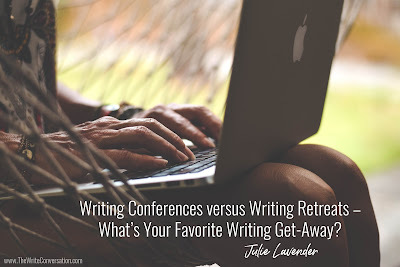
by Julie Lavender @JLavenderWrites
Last month, I penned my June column for The Write Conversation shortly after returning from the Blue Ridge Mountains Christian Writers Conference. This month, I’m still enjoying memories of a recent writing retreat, hosted by the publisher for my children’s picture book, releasing in the fall of next year. The first End Game Press Writing Retreat took place in Destin, Florida, and oh my—what beautiful emerald waters and gorgeous white sand!
Have you ever attended a writing retreat? Different from writers’ conferences in so many ways, a writing retreat typically offers less (or no) workshops and more quiet time for brainstorming or writing on that WIP— “work in progress.”
I’ve attended only three writing retreats over the years, the most recent one with End Game Press and two previous smaller ones with my children’s writing group. All three were marvelously productive and beneficial to my writing path.
Let’s compare the characteristics of conferences and retreats to see if one or both might aid your current writing journey.
The biggest difference between a writing conference and a writing retreat is the amount of free time available to work on a current project.
Most conferences squeeze in as many classes and workshops as possible, offering sessions for the beginner to the experienced. The classes are optional, of course, for the attendee, but participants won’t want to miss the vast knowledge, expertise, and experience of writing instructors who serve as faculty at conferences. Many conferences offer extra bonuses of VIP breakfasts and lunches with faculty sharing personal stories of their writing journey. Some of those same conferences also offer “after-hour” sessions with additional teaching workshops.
Like I mentioned—conferees can basically sit under the tutelage of well-versed authors and writers from sunup until way past sundown. The grand lineup of authorities in the industry at a writing conference leaves very little free time that an attendee can devote to writing.
Another huge blessing and opportunity offered at conferences is the act of networking. Meeting editors, agents, published authors, and not-yet-published authors at conferences is often worth the price of admission in and of itself! Those acquaintances who become good friends offer wise advice about writing and publishing. And, sometimes the added bonus is a publishing contract for a book, article, or anthology contribution.
Writing retreats often boast of ample time to spend writing on a current project. That window of time is worked into the schedule, with no classes or workshops offered at the same time to prevent distractions for the writer.
Most retreats have a narrower focus than a conference. For example, an upcoming retreat at Ridgecrest taking place in October focus specifically on novel writing. The Mountainside Novelist Retreat, with a stellar lineup of novelist experts, offers instruction time in the craft of writing, book launches, organization, social media, and marketing, but also sets aside a large portion of time for attendees to devote to private writing.
Other writing retreats throughout the year, across the country, sport a similar schedule.
Writing retreats also encompass small, intimate groups of writers with very specific plans in mind for the time together. Typically, these retreats include a huge amount of the day set aside for individual writing, with late afternoon or evening designated as a time to gather to critique, brainstorm, or share writing goals and accomplishments.
What would help you the most right now with your writing journey, a conference, a retreat, or BOTH! I love conferences and retreats because they serve different, helpful purposes for my writing journey. As for me, I plan to make time for conferences and retreats each year on my calendar.
What about you? Do you attend conferences and retreats? Maybe you’ve even taken a solitary writing retreat, one in which you traveled to a location away from your home to work on or complete a writing project. Share your conference and retreat experiences and join the conversation.
TWEETABLEWriting Conferences versus Writing Retreats – What’s Your Favorite Writing Get-Away? from @JLavenderWrites on @EdieMelson (Click to Tweet)
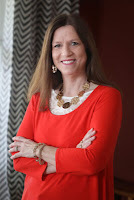 Author and journalist Julie Lavender loves writing conferences and writing retreats and believes both have helped her in so many ways along the path to publication. Julie is the author of Children’s Bible Stories for Bedtime (Penguin Random House), 365 Ways to Love Your Child: Turning Little Moments into Lasting Memories (Revell/Baker), a forthcoming mom’s devotional from Penguin Random House, and two picture books from End Game Press and its imprint.
Author and journalist Julie Lavender loves writing conferences and writing retreats and believes both have helped her in so many ways along the path to publication. Julie is the author of Children’s Bible Stories for Bedtime (Penguin Random House), 365 Ways to Love Your Child: Turning Little Moments into Lasting Memories (Revell/Baker), a forthcoming mom’s devotional from Penguin Random House, and two picture books from End Game Press and its imprint.Featured Image: Photo by Trinity Treft on Unsplash
Published on July 12, 2023 22:00
Writing Conferences verses Writing Retreats – What’s Your Favorite Writing Get-Away?
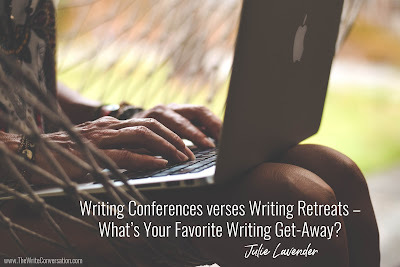
by Julie Lavender @JLavenderWrites
Last month, I penned my June column for The Write Conversation shortly after returning from the Blue Ridge Mountains Christian Writers Conference. This month, I’m still enjoying memories of a recent writing retreat, hosted by the publisher for my children’s picture book, releasing in the fall of next year. The first End Game Press Writing Retreat took place in Destin, Florida, and oh my—what beautiful emerald waters and gorgeous white sand!
Have you ever attended a writing retreat? Different from writers’ conferences in so many ways, a writing retreat typically offers less (or no) workshops and more quiet time for brainstorming or writing on that WIP— “work in progress.”
I’ve attended only three writing retreats over the years, the most recent one with End Game Press and two previous smaller ones with my children’s writing group. All three were marvelously productive and beneficial to my writing path.
Let’s compare the characteristics of conferences and retreats to see if one or both might aid your current writing journey.
The biggest difference between a writing conference and a writing retreat is the amount of free time available to work on a current project.
Most conferences squeeze in as many classes and workshops as possible, offering sessions for the beginner to the experienced. The classes are optional, of course, for the attendee, but participants won’t want to miss the vast knowledge, expertise, and experience of writing instructors who serve as faculty at conferences. Many conferences offer extra bonuses of VIP breakfasts and lunches with faculty sharing personal stories of their writing journey. Some of those same conferences also offer “after-hour” sessions with additional teaching workshops.
Like I mentioned—conferees can basically sit under the tutelage of well-versed authors and writers from sunup until way past sundown. The grand lineup of authorities in the industry at a writing conference leaves very little free time that an attendee can devote to writing.
Another huge blessing and opportunity offered at conferences is the act of networking. Meeting editors, agents, published authors, and not-yet-published authors at conferences is often worth the price of admission in and of itself! Those acquaintances who become good friends offer wise advice about writing and publishing. And, sometimes the added bonus is a publishing contract for a book, article, or anthology contribution.
Writing retreats often boast of ample time to spend writing on a current project. That window of time is worked into the schedule, with no classes or workshops offered at the same time to prevent distractions for the writer.
Most retreats have a narrower focus than a conference. For example, an upcoming retreat at Ridgecrest taking place in October focus specifically on novel writing. The Mountainside Novelist Retreat, with a stellar lineup of novelist experts, offers instruction time in the craft of writing, book launches, organization, social media, and marketing, but also sets aside a large portion of time for attendees to devote to private writing.
Other writing retreats throughout the year, across the country, sport a similar schedule.
Writing retreats also encompass small, intimate groups of writers with very specific plans in mind for the time together. Typically, these retreats include a huge amount of the day set aside for individual writing, with late afternoon or evening designated as a time to gather to critique, brainstorm, or share writing goals and accomplishments.
What would help you the most right now with your writing journey, a conference, a retreat, or BOTH! I love conferences and retreats because they serve different, helpful purposes for my writing journey. As for me, I plan to make time for conferences and retreats each year on my calendar.
What about you? Do you attend conferences and retreats? Maybe you’ve even taken a solitary writing retreat, one in which you traveled to a location away from your home to work on or complete a writing project. Share your conference and retreat experiences and join the conversation.
TWEETABLEWriting Conferences verses Writing Retreats – What’s Your Favorite Writing Get-Away? from @JLavenderWrites on @EdieMelson (Click to Tweet)
 Author and journalist Julie Lavender loves writing conferences and writing retreats and believes both have helped her in so many ways along the path to publication. Julie is the author of Children’s Bible Stories for Bedtime (Penguin Random House), 365 Ways to Love Your Child: Turning Little Moments into Lasting Memories (Revell/Baker), a forthcoming mom’s devotional from Penguin Random House, and two picture books from End Game Press and its imprint.
Author and journalist Julie Lavender loves writing conferences and writing retreats and believes both have helped her in so many ways along the path to publication. Julie is the author of Children’s Bible Stories for Bedtime (Penguin Random House), 365 Ways to Love Your Child: Turning Little Moments into Lasting Memories (Revell/Baker), a forthcoming mom’s devotional from Penguin Random House, and two picture books from End Game Press and its imprint.Featured Image: Photo by Trinity Treft on Unsplash
Published on July 12, 2023 22:00
July 11, 2023
The Basics of Writing and Blogging for the Digital Audience
Edie here and I'm super excited to give you a sneak peek at my new blogging book,
Blogging for Today's Writer
! I'm headed to a conference this week to teach, but next week we'll be flooding the Internet with the launch of this latest book in the Writer's Bookshelf series. It is already live on Amazon, so I'll leave the link below and I'd love for you to take a look and if you purchase the book, be sure to leave a review!
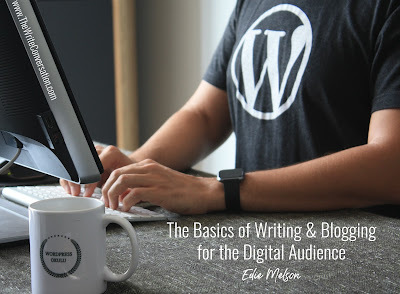
The Basics of Writing & Blogging for the Digital Audienceby Edie Melson @EdieMelson
Writing to an online audience takes some specific skills and considerations. They're not difficult things, but here are some
Specific Things to Remember When Blogging
Digital readers read differently. Most of the time they’re looking for take-away. The application they’re seeking can range from how to have a healthy marriage to how to write an effective blog post. But almost always they’re seeking something to make their lives richer. Digital readers are reading on very small devices. Over 66% of the readers of your posts will look at them on a mobile device—usually a phone. This means that formatting matters.Digital readers skim first, read second. Think about the way you approach reading on the internet. It’s very likely that you do several things without evening thinking about them.You consider the title and whether or not the subject is something you need or are interested inYou read the first sentence or two.You skim the piece, looking for bold headings and possible lists (numbered or bulleted) And only then do you invest in reading the entire post. Digital readers are suspicious and skeptical. All it takes for my skeptic radar to click on is for someone to claim they have the next best, biggest thing. Unless the post I’m reading can prove it has something useful to say in the first sentence—maybe the first paragraph—then I’m done and on to the next post.Digital readers have lots of choices. They can find literally thousands of posts on almost any subject you may choose to write about. This means you have to make sure you’re writing in such a way they want to return. AND you must make certain it’s easy for them to return. That’s why sidebar gadgets and widgets are so important. If you don’t have a way for them to sign up for updates when a new post goes live, you’ll lose them to other sites.
Back to the Beginning Beginnings and endings are critical to your success as a blogger. These are some of the things you need to consider to make sure your readers engages.
1. Start with the title of your post. Your title will make or break your post’s visibility. With a good title, the post will rank higher in the search engines, it will have context on social media, and it will give your reader a way to evaluate whether or not the post is relative to them (more specifics about titles in the next chapter).
Yeah, it’s that important. And I spend at least as much time and energy on composing an effective title as I do writing the entire post.Make sure your post contains a phrase that is something a reader would type into a search engine to find the information within your post. Originally the information in this section was a blog post titled, The Importance of Beginnings and Endings. Yes, that’s what that post was about, but that’s not something many people would be searching for and it’s a little vague. So instead I moved to Writing Blog Posts People Will Read. But even that could be improved upon. Readers love tips and takeaways, so I finally settled on Tips For Writing Blog Posts People Will Read. Not very exciting, but super effective.Choose a title that will have relevance if it's read somewhere other than on your site. For example, suppose the title and link are shared on social media without an accompanying image. Does the person reading it have enough context to know what the title pertains to. Here's what I mean, let's go back to the original title I was considering, The Importance of Beginnings and Endings. That title is not good because that title has no context. We have no way of knowing whether that refers to life, marriage, blogging or writing a novel.
2. Front load the information contained within the post. This is just a fancy way of saying that we need to share the takeaway first. In my opening paragraphs I told you what I’d share in this post. Sum up what you’re going to share before you get into the details.
3. Write your post using bold headings, lists and lots of white space. Reading on a mobile device, or even a computer is harder on our eyes than reading a physical magazine or book. That’s why we have to format for an audience that’s using those mediums.Choose a sans serif font for readability. This means something without those extra flourishes (called serifs). I recommend Ariel, Verdana, or Helvetica. Times New Roman is never a good choice for online readability. My site, The Write Conversation, uses Verdana.Use block formatting. This means no indented paragraphs and an extra blank line between paragraphs.Use shorter sentences and shorter paragraphs. Sentences shouldn’t be over twelve words in length. A block of text (paragraph) shouldn’t exceed six lines.
4. Choose a header image (called a feature image in WordPress) that illustrates the focus of your post. For extra click-throughs on social media, make sure you make it into a meme with the title of your post embedded in the image.
5. Include a Click to Tweet. This is an embedded link that makes it easier for readers to share your post on social media. By including this one thing, your posts will be shared approximately sixty percent more on social media.
6. Wrap it up with a call to action. No, this doesn’t mean you should try to sell them something. Instead, it’s up to you to get the conversational ball rolling. We all want to engage with those who read our posts. And we have to spell out how to do it. So end each post with one of these options:An open-ended question. A yes or no question stops the conversation. Instead use something that leads to discussion or sharing of opinions.A challenge. Sometimes an open-ended question just doesn’t fit (like with some devotions). Instead issue a challenge, maybe something like this: “Today I’ve decided to make a difference by looking for ways to reach out to others, will you join me?”A specific set of instructions of what to do. Often I end my posts with something like: “Now it’s your turn . . . be sure to share your thoughts in the comments section below.”
All of these tips will help you build an audience that’s loyal, engaged, and willing to share your posts with their friends and family.
TWEETABLEThe Basics of Writing & Blogging for the Digital Audience, blogging tips from expert @EdieMelson (Click to Tweet)
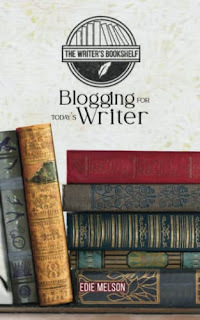 Blogging for Today's Writer
by Edie Melson
Blogging for Today's Writer
by Edie Melson
Is blogging still relevant for connecting with readers? Yes! Find out why and take a pragmatic and practical look at the how-to’s, including:
how to find your blog’s focushow to write for the mobile and internet audiencesmaneuvering the SEO, keyword basics, and titlesAnd many more keys to successful blogging.
 Edie Melson is a woman of faith with ink-stained fingers observing life through her camera lens. She’s a writer who feels lost without that device & an unexpected speaker who loves to encourage an audience. She also embraces the ultimate contradiction of being an organized creative. She knows the necessity of Soul Care and leads retreats, conferences & workshops around the world on staying connected to God. Her numerous books, including the award-winning Soul Cares eries & reflect her passion to help others develop the strength of their God-given gifts. Her blog, The Write Conversation is recognized as one of the top 101 industry resources.
Edie Melson is a woman of faith with ink-stained fingers observing life through her camera lens. She’s a writer who feels lost without that device & an unexpected speaker who loves to encourage an audience. She also embraces the ultimate contradiction of being an organized creative. She knows the necessity of Soul Care and leads retreats, conferences & workshops around the world on staying connected to God. Her numerous books, including the award-winning Soul Cares eries & reflect her passion to help others develop the strength of their God-given gifts. Her blog, The Write Conversation is recognized as one of the top 101 industry resources.
She and husband Kirk have been married 40+ years and raised three sons. They live in the foothills of the Blue Ridge Mountains and can often be found hiking—with Edie clinging to the edge of a precipice for the perfect camera angle and Kirk patiently carrying her camera bag and tripod. Connect with her on her website, WWW.EDIEMELSON.COM and through social media.
Featured Image: Photo by Fikret tozak on Unsplash

The Basics of Writing & Blogging for the Digital Audienceby Edie Melson @EdieMelson
Writing to an online audience takes some specific skills and considerations. They're not difficult things, but here are some
Specific Things to Remember When Blogging
Digital readers read differently. Most of the time they’re looking for take-away. The application they’re seeking can range from how to have a healthy marriage to how to write an effective blog post. But almost always they’re seeking something to make their lives richer. Digital readers are reading on very small devices. Over 66% of the readers of your posts will look at them on a mobile device—usually a phone. This means that formatting matters.Digital readers skim first, read second. Think about the way you approach reading on the internet. It’s very likely that you do several things without evening thinking about them.You consider the title and whether or not the subject is something you need or are interested inYou read the first sentence or two.You skim the piece, looking for bold headings and possible lists (numbered or bulleted) And only then do you invest in reading the entire post. Digital readers are suspicious and skeptical. All it takes for my skeptic radar to click on is for someone to claim they have the next best, biggest thing. Unless the post I’m reading can prove it has something useful to say in the first sentence—maybe the first paragraph—then I’m done and on to the next post.Digital readers have lots of choices. They can find literally thousands of posts on almost any subject you may choose to write about. This means you have to make sure you’re writing in such a way they want to return. AND you must make certain it’s easy for them to return. That’s why sidebar gadgets and widgets are so important. If you don’t have a way for them to sign up for updates when a new post goes live, you’ll lose them to other sites.
Back to the Beginning Beginnings and endings are critical to your success as a blogger. These are some of the things you need to consider to make sure your readers engages.
1. Start with the title of your post. Your title will make or break your post’s visibility. With a good title, the post will rank higher in the search engines, it will have context on social media, and it will give your reader a way to evaluate whether or not the post is relative to them (more specifics about titles in the next chapter).
Yeah, it’s that important. And I spend at least as much time and energy on composing an effective title as I do writing the entire post.Make sure your post contains a phrase that is something a reader would type into a search engine to find the information within your post. Originally the information in this section was a blog post titled, The Importance of Beginnings and Endings. Yes, that’s what that post was about, but that’s not something many people would be searching for and it’s a little vague. So instead I moved to Writing Blog Posts People Will Read. But even that could be improved upon. Readers love tips and takeaways, so I finally settled on Tips For Writing Blog Posts People Will Read. Not very exciting, but super effective.Choose a title that will have relevance if it's read somewhere other than on your site. For example, suppose the title and link are shared on social media without an accompanying image. Does the person reading it have enough context to know what the title pertains to. Here's what I mean, let's go back to the original title I was considering, The Importance of Beginnings and Endings. That title is not good because that title has no context. We have no way of knowing whether that refers to life, marriage, blogging or writing a novel.
2. Front load the information contained within the post. This is just a fancy way of saying that we need to share the takeaway first. In my opening paragraphs I told you what I’d share in this post. Sum up what you’re going to share before you get into the details.
3. Write your post using bold headings, lists and lots of white space. Reading on a mobile device, or even a computer is harder on our eyes than reading a physical magazine or book. That’s why we have to format for an audience that’s using those mediums.Choose a sans serif font for readability. This means something without those extra flourishes (called serifs). I recommend Ariel, Verdana, or Helvetica. Times New Roman is never a good choice for online readability. My site, The Write Conversation, uses Verdana.Use block formatting. This means no indented paragraphs and an extra blank line between paragraphs.Use shorter sentences and shorter paragraphs. Sentences shouldn’t be over twelve words in length. A block of text (paragraph) shouldn’t exceed six lines.
4. Choose a header image (called a feature image in WordPress) that illustrates the focus of your post. For extra click-throughs on social media, make sure you make it into a meme with the title of your post embedded in the image.
5. Include a Click to Tweet. This is an embedded link that makes it easier for readers to share your post on social media. By including this one thing, your posts will be shared approximately sixty percent more on social media.
6. Wrap it up with a call to action. No, this doesn’t mean you should try to sell them something. Instead, it’s up to you to get the conversational ball rolling. We all want to engage with those who read our posts. And we have to spell out how to do it. So end each post with one of these options:An open-ended question. A yes or no question stops the conversation. Instead use something that leads to discussion or sharing of opinions.A challenge. Sometimes an open-ended question just doesn’t fit (like with some devotions). Instead issue a challenge, maybe something like this: “Today I’ve decided to make a difference by looking for ways to reach out to others, will you join me?”A specific set of instructions of what to do. Often I end my posts with something like: “Now it’s your turn . . . be sure to share your thoughts in the comments section below.”
All of these tips will help you build an audience that’s loyal, engaged, and willing to share your posts with their friends and family.
TWEETABLEThe Basics of Writing & Blogging for the Digital Audience, blogging tips from expert @EdieMelson (Click to Tweet)
 Blogging for Today's Writer
by Edie Melson
Blogging for Today's Writer
by Edie MelsonIs blogging still relevant for connecting with readers? Yes! Find out why and take a pragmatic and practical look at the how-to’s, including:
how to find your blog’s focushow to write for the mobile and internet audiencesmaneuvering the SEO, keyword basics, and titlesAnd many more keys to successful blogging.
 Edie Melson is a woman of faith with ink-stained fingers observing life through her camera lens. She’s a writer who feels lost without that device & an unexpected speaker who loves to encourage an audience. She also embraces the ultimate contradiction of being an organized creative. She knows the necessity of Soul Care and leads retreats, conferences & workshops around the world on staying connected to God. Her numerous books, including the award-winning Soul Cares eries & reflect her passion to help others develop the strength of their God-given gifts. Her blog, The Write Conversation is recognized as one of the top 101 industry resources.
Edie Melson is a woman of faith with ink-stained fingers observing life through her camera lens. She’s a writer who feels lost without that device & an unexpected speaker who loves to encourage an audience. She also embraces the ultimate contradiction of being an organized creative. She knows the necessity of Soul Care and leads retreats, conferences & workshops around the world on staying connected to God. Her numerous books, including the award-winning Soul Cares eries & reflect her passion to help others develop the strength of their God-given gifts. Her blog, The Write Conversation is recognized as one of the top 101 industry resources. She and husband Kirk have been married 40+ years and raised three sons. They live in the foothills of the Blue Ridge Mountains and can often be found hiking—with Edie clinging to the edge of a precipice for the perfect camera angle and Kirk patiently carrying her camera bag and tripod. Connect with her on her website, WWW.EDIEMELSON.COM and through social media.
Featured Image: Photo by Fikret tozak on Unsplash
Published on July 11, 2023 22:00
July 10, 2023
How to Respond to Those Who Choose to Judge Us and the Words We Write
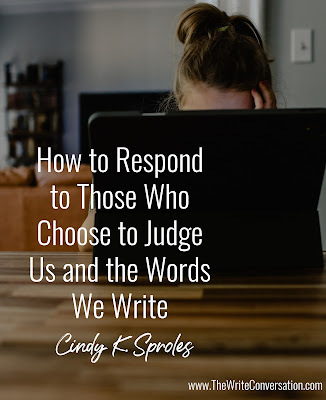
by Cindy K. Sproles @CindyDevoted
It's an age-old thorn in the flesh to writers. Judgements. We get them from every twist and turn—from family members who think there is nothing in a writing career to overzealous writers who think their knowledge far exceeds that of the average writer and find it fine to rip and tear apart the other's work.
Let's face it. Writers don't seem to catch a break.
There! You've just had your 30-second pity party. Now, let's address the people who choose to judge us.
The People Who Can Hurt Writers the Most
1. Well-meaning family members: In all fairness, most criticism comes from a lack of understanding for family members. All they see is the long lead time as we learn the craft and then wait (sorta patiently) for that first contract. "Find a job that will support you." I've heard that more times than I can count, but the truth is, these remarks come from loving family members who don't realize the immense writing opportunities available to writers. I have friends who make a solid $20K-$40K a year writing articles for both paper and online magazines and who fill positions from home for companies needing a constant influx of content.
By that same token, I have friends who write technical books for companies, student guides and process manuals, materials for products, and product usage descriptions. Trust me. Writing is a career where a writer with a good work ethic can make a tidy living. Because our family members love us, and because they aren't aware of the vast opportunities in the writing field, their "I-just-want-what's-best-for-you" love comes out. Take time to pull out that Christian Writers Market Guide and show them the opportunities available. Get to work and then show them those checks as they come in the mail.
**Warning: I did not say this was easy. Nothing worth having is easy. It takes work and continued submissions, but you can make a good living once you break in, and with good work, folks will look to you for return submissions. If you question that, talk to our friend and director of the Blue Ridge Mountain Christian Writers Conference, Edie Melson. She is proof you can make a nice living writing for magazines and online needs.
2. High School guidance counselors: I don't want to peg all guidance counselors because many are wonderful at helping students get into great writing programs as they enter college. You know, that thing called journalism. There's even a master's program called a MFA. Still, again, well-meaning and less informed counselors will urge students to find good-paying jobs and seek their writing dream on the side. When I met with my guidance counselor during my senior year of high school, I told him I wanted to be a writer. He laughed, then remarked, "Only Stephen King makes money in writing. What else would you like to do? Parents, teach your children that if they feel a calling toward writing, they may have to push a little harder to get past the negative ninnies. We need good writers to teach new writers lest we all fall to AI.
3. Cocky writers: Because we are writers, we tend to be hard on our peers, assuming they should know the ins and outs of the craft. They pick apart every paragraph, making remarks that leave you feeling as though their eyes do the "roll" with each page they turn. It's not hard to pinpoint writer reviews either—for one, they are very long, describing the entire storyline and use words like protagonist, voice, plotline, and story arc.
It's important to note that every book rarely fails to receive a one or two-star review. You can't please every reader, but the writer must take hold of their confidence and remember that tidbit. You'd think writers would have a kinder view of other writers, but there are those who like to flex their writing muscles and shred books in a review.
Every book is not for every person, and I understand some books on the shelves shouldn't be. But that is not my excuse to demean a person. Book reviews need to be honest, but they can be written kindly. There is no need to say that there was nothing in this book I liked, or I dreaded looking at it on the table every time I passed it. Kind reviews can be written, even if you didn't like the book. Writers can say, This wasn't the book for me, or I appreciated the work the writer put into this book, even if it's not my cup of tea.
Writers can say the read was difficult to follow or even that it lost them at times, but there is no need to be mean. Readers will get that it wasn't a great book for you. In your honesty, be kind.
One final note: Should you receive a blasting review, you have three choices. Respond back in an ugly mannerDon't respond at all, and Respond with kindness
Most seasoned writers will tell you not to respond. Not bad advice, by the way. If you get a particularly mean review that you feel you must respond to, simply thank the reader for giving you their time to read the book to its end. That's it. Not a word more, because it's tough to be mean when someone offers you kindness.
As writers, there will always be the critic, and your greatest lesson is to become like a duck and let the words slip off your feathers like raindrops. Have confidence that you are called to do a task. Do your best work and then offer that work back to the Father who has gifted you. Learn the craft. Believe in yourself and practice, practice, practice. More so, don't let the negative words make you sour. Instead, let them become the rungs on the ladder you step on as you rise to your best.
TWEETABLEHow to Respond to Those Who Choose to Judge Us and the Words We Write, @CindyDevoted on @EdieMelson (Click to Tweet)
 Cindy K. Sproles is an author, speaker, and conference teacher. Having served for a number of years as a managing editor for Lighthouse Publishing of the Carolinas and Ironstream Media, Cindy now works as a mentor, coach, and freelance editor. She is the co-founder of Writing Right Author Mentoring Services with Lori Marett and she is the director of the Asheville Christian Writers Conference. Cindy is also the co-founder of Christian Devotions Ministries and WWW.CHRISTIANDEVOTIONS.US, as well as WWW.INSPIREAFIRE.COM. Her devotions are in newspapers and magazines nationwide, and her novels have become award-winning best-selling works. She is a popular speaker at conferences and a natural encourager. Cindy is a mountain girl, born and raised in the Appalachian mountains, where she and her husband still reside. She has raised four sons and now resorts to raising chickens where the pecking order is easier to manage. You can visit Cindy at WWW.CINDYSPROLES.COM or www.wramsforwriters.com.
Cindy K. Sproles is an author, speaker, and conference teacher. Having served for a number of years as a managing editor for Lighthouse Publishing of the Carolinas and Ironstream Media, Cindy now works as a mentor, coach, and freelance editor. She is the co-founder of Writing Right Author Mentoring Services with Lori Marett and she is the director of the Asheville Christian Writers Conference. Cindy is also the co-founder of Christian Devotions Ministries and WWW.CHRISTIANDEVOTIONS.US, as well as WWW.INSPIREAFIRE.COM. Her devotions are in newspapers and magazines nationwide, and her novels have become award-winning best-selling works. She is a popular speaker at conferences and a natural encourager. Cindy is a mountain girl, born and raised in the Appalachian mountains, where she and her husband still reside. She has raised four sons and now resorts to raising chickens where the pecking order is easier to manage. You can visit Cindy at WWW.CINDYSPROLES.COM or www.wramsforwriters.com.Featured Image: Photo by Kelly Sikkema on Unsplash
Published on July 10, 2023 22:00
July 9, 2023
Do the Questions Writers Ask Really Have Concrete Answers?
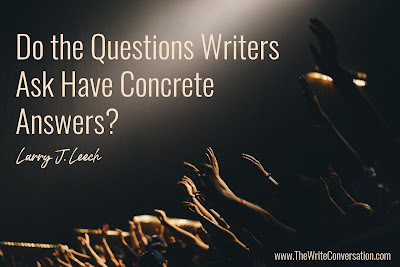
by Larry J. Leech @LarryJLeechII
So many writing and publishing questions—so few concrete answers.Music or no music?At home or at a coffee shop?With friends or by oneself?Work on a blog or a book?First person or third person?Short chapter or long chapter?Write or edit?
A popular villain in the “Batman” movie released in 1995 said in an exasperated tone, “Too many questions. Too many questions.”
Writers often face a number of questions. Sometimes the answer is cut and dried, black and white, or simply this and not that. But most of the time, the answer relies on the writer’s personal preference.
In all my years of working with writers, particularly those new to the publishing journey, many want a concrete answer even when there isn’t one.
Three Frequent Questions Writers Ask:“How long should my chapter be?”“How many words should I write a day or how many hours?”“When should I write?”
All great questions, but none of which have a concrete answer. Chapters can vary in length, depending on the topic or the story. I teach that 2,300-2,700 words works best, but a chapter of 1,200 words can work, if it fits the flow of the story. Thirty-five hundred words can work too.
The most important thing to remember about chapter length: don’t bog down the story with unnecessary details or information that could make the reader lose interest. If the reader does, reading becomes work, and they’ll likely stop reading.
As for the second question, I often and absolutely say, whatever works best for the author. Some people are capable of writing 1,000 words a day. Others 500. The key is a commitment to a total that will not overwhelm the author. When an author becomes overwhelmed, they have a choice: push throw or quit. Unfortunately, many quit.
Remember, 500 words a day equals 2,500 words a week, 10,000 words a month, 60,000 words in six months. And I discourage an author from writing seven days a week early in their writing journey. Just too demanding. I also stress to NOT try and write for eight straight hours on a weekend. Most new writers just don’t have the discipline to write for that length of time.
The third question—“When should I write?”—depends on when the writer can write uninterrupted and stay focused. Jerry B. Jenkins wrote many of his first books at night after his kids went to bed. Ted Dekker also wrote late at night early in his career.
Every writer must find their peak writing time. A number of writers I’ve coached have said they write best in the morning, around 4-5 a.m., before the family gets up. I always reply, “Hats off to you. I do one thing at that time. … Sleep.”
I’m sure you’ve heard this over and over: Writing a book is a marathon, not a sprint.
Don’t wear yourself out at the beginning and flame out. Pace yourself. Find what works best for you. And enjoy the journey.
TWEETABLEDo the Questions Writers Ask Really Have Concrete Answers? from author and editor @LarryJLeechII on @EdieMelson (Click to Tweet)
 Editor-in-Chief at Bold Vision Books and writing coach of award-winning authors, Larry J. Leech II has spent more than forty years writing and editing. He started his career as a sportswriter in southwestern Pennsylvania where he covered prep, college, and pro sports, including the Pittsburgh Pirates and Steelers.
Editor-in-Chief at Bold Vision Books and writing coach of award-winning authors, Larry J. Leech II has spent more than forty years writing and editing. He started his career as a sportswriter in southwestern Pennsylvania where he covered prep, college, and pro sports, including the Pittsburgh Pirates and Steelers. In 2004, after 2,300 published articles, Larry moved into the book publishing industry. Since that time, he has ghostwritten 30 books, edited more than 400 manuscripts, and coached hundreds of authors through the writing and publication process. You can find him online on Twitter, Facebook, and Instagram.
Featured Image: Photo by Edwin Andrade on Unsplash
Published on July 09, 2023 22:00
July 8, 2023
Me and Jesus Time and Writing
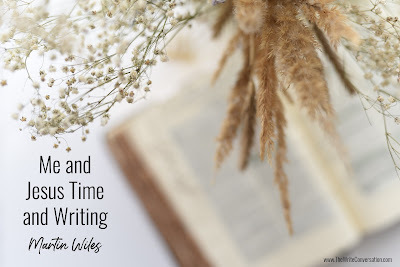
by Martin Wiles @LinesFromGod
Four chairs snuggled up to the kitchen table like a thirsty cowboy to a bar after a long, dusty trail ride. She patted one of the chairs and said, “At 7:05, me and Jesus time happens here. But you can sit in one of the other chairs.”
My wife and I were on our final trip to see our Arkansas family. Our son-in-law had accepted a transfer back to our home state. We planned to bring back our three grandboys before our daughter and son-in-law’s move a few days later.
Finding a place to set up my computer station for writing, editing, and social media posting has always been challenging when we visit. This time proved even more tricky and dangerous because a two-year-old toddler bounced around like a tornado in an alley.
But that wasn’t the most pressing problem. Not wanting to store any more belongings than necessary until they found their next residence, my daughter sold almost all the furniture. We even had to bring along our camping chairs to have a place to sit during the day. Fortunately, she had not sold the kitchen table—although it was on the list to be sold the day after we left.
At 6:15, I assumed my position at the table to write, edit, and post on social media. Sure enough, thirty minutes later, my daughter appeared with her Bible, journal, pen, highlighter, and coffee. Her Jesus time was at hand.
Although my Jesus time looked slightly different than hers, I had mine too. Mine entailed a computer, banging on a keyboard, and drinking a cup of orange juice—coffee to come later.
I learned about Jesus time from my parents and grandparents. Some observed their Jesus time in the morning, some at night, and some during the day. But they had it.
Dad taught me as a young boy about having my own Jesus time. I needed to read my Bible and pray daily. So I did. Before going to bed, I read my Bible and then said my prayers.
Though the years, I’ve maintained my Jesus time. How it looks has changed, but it’s still that time when I get alone with God, pour over his Word, pray, and listen for his Spirit to guide me.
As Christian writers, our Jesus time often entails putting words on paper—fiction and nonfiction, handwritten and typed. And we should do this consistently. Our word count will vary, as will how many days each week we write, but write we will. We have no choice. God has called us.
Like Jeremiah, we say, “But if I say I’ll never mention the Lord or speak in his name, his word burns in my heart like a fire. It’s like a fire in my bones! I am worn out trying to hold it in! I can’t do it” (20:9 NLT)!
Yet at times, life happens. Deadlines, conferences, sickness, disease, work, aging parents, changing family dynamics. We might have to rearrange our Jesus time, but we must maintain it. It’s too critical to let go.
Like Mary, we must sit at the feet of Jesus with our journals and laptops and listen. “Her sister, Mary, sat at the Lord’s feet, listening to what he taught” (Luke 10:39 NLT).
Martha was busy. Nothing wrong with that. The old adage is right: “An idle mind is the devil’s workshop.” But we need time daily when we quiet ourselves before our Lord, whether we write or not.
Seeing my daughter have her Jesus time made me proud. I taught her well and gave her an example.
Without Jesus’ time, we can’t navigate this thing called life, love the unlovable, be patient, trust God during difficult times, make wise decisions, or know which writing path to pursue.
What are some ways you can ensure your me and Jesus time happens?
TWEETABLEMe and Jesus Time and Writing from author Martin Wiles (@LinesFromGod) on @EdieMelson (Click to Tweet)
 Martin Wiles is the founder of Love Lines from God (WWW.LOVELINESFROMGOD.COM) and serves as Managing Editor for Christian Devotions and Directing Editor for VineWords. He has authored six books and has been published in numerous publications. His most recent book, DON'T JUST LIVE...REALLY LIVE, debuted in October of 2021. He is a freelance editor, English teacher, author, and pastor.
Martin Wiles is the founder of Love Lines from God (WWW.LOVELINESFROMGOD.COM) and serves as Managing Editor for Christian Devotions and Directing Editor for VineWords. He has authored six books and has been published in numerous publications. His most recent book, DON'T JUST LIVE...REALLY LIVE, debuted in October of 2021. He is a freelance editor, English teacher, author, and pastor.Featured Image: Photo by Jasmin Ne on Unsplash
Published on July 08, 2023 22:00
July 7, 2023
10 Quotes to Inspire Your Creativity

by Beth K. Vogt @BethVogt
Writers, we are nothing if not creative.
Whether we write non-fiction or fiction, our craft begins with a spark. A question that needs to be answered. A what ifthat lures us down an imaginary path.
We talk about an inspirational muse, but writing is hard work and perseverance blended with that creative catalyst. As a life-long lover of quotes, I’ve compiled ten favorite quotes about creativity. I hope they inspire you today, wherever you are along the writing road. Let me know if you highlight one or two—or even post a quote above your desk for continued motivation.
Quotes to Inspire a Writer's Creativity
1. “Creativity is a wild mind and a disciplined eye.” Dorothy Parker (1893-1967), American poet
2. “You can't use up creativity. The more you use, the more you have.” Maya Angelou (1928-2014), American memoirist
3. “To live a creative life, we must lose our fear of being wrong.” Joseph Chilton Pearce (1926-2016), American author
4. “The worst enemy to creativity is self-doubt.” Sylvia Plath (1932-1963), American poet
5. “Start where you are. Use what you have. Do what you can.” Arthur Ashe (1943-1993), American tennis player
6. “There is no such thing as a new idea. We simply take a lot of old ideas and put them into a sort of mental kaleidoscope.” Mark Twain (1835-1910), American humorist
7. “Making the simple complicated is commonplace. Making the complicated simple, awesomely simple, that’s creativity.” Charles Mingus (1922-1979), American jazz musician
8. “If you want to live your life in a creative way, as an artist, you have to not look back too much.” Steve Jobs (1955-2011), American business magnate
9. “The creative adult is the child who survived.” Ursula K. Le Guin (1929-2018), American author.
10. “Ideas come from everything.” Alfred Hitchcock (1899-1980), English filmmaker
TWEETABLE10 Quotes to Inspire Your Creativity from author @BethVogt on @EdieMelson (Click to Tweet)
 Beth K. Vogt believes God’s best often waits behind the doors marked “Never.” She’s authored 14 novels and novellas, both romance and women’s fiction. Beth is a Christy Award winner, an ACFW Carol Award winner, and a RITA® finalist. Her novel Things I Never Told You, book one in her Thatcher Sisters Series by Tyndale House Publishers, won the 2109 AWSA Golden Scroll Award for Contemporary Novel of the Year. An established magazine writer and former editor of the leadership magazine for MOPS International, Beth blogs for Learn How to Write a Novel and The Write Conversation and also enjoys speaking to writers group and mentoring other writers. She lives in Colorado with her husband Rob, who has adjusted to discussing the lives of imaginary people. Connect with Beth at bethvogt.com.
Beth K. Vogt believes God’s best often waits behind the doors marked “Never.” She’s authored 14 novels and novellas, both romance and women’s fiction. Beth is a Christy Award winner, an ACFW Carol Award winner, and a RITA® finalist. Her novel Things I Never Told You, book one in her Thatcher Sisters Series by Tyndale House Publishers, won the 2109 AWSA Golden Scroll Award for Contemporary Novel of the Year. An established magazine writer and former editor of the leadership magazine for MOPS International, Beth blogs for Learn How to Write a Novel and The Write Conversation and also enjoys speaking to writers group and mentoring other writers. She lives in Colorado with her husband Rob, who has adjusted to discussing the lives of imaginary people. Connect with Beth at bethvogt.com.Featured Image: Photo by Boitumelo on Unsplash
Published on July 07, 2023 22:00
July 6, 2023
Worldbuilding 101 for Writers: Writing Faith and Religion

by A.C. Williams @ACW_Author
If you woke up this morning and spent time reading your Bible, why did you do it? If you know someone who faces eastward to pray, do you know why they do it? Do you know an Amish person who doesn’t wear clothing with zippers or snaps? Or maybe you know a Jewish person who doesn’t eat pork.
Why do people do these things?
So far in this Worldbuilding 101 series, we’ve talked about Existing History, People and Social Circles, Language and Communication, Climate and Geography, and Agriculture. All of these are really important elements to building a believable world your readers can engage with. But this month’s topic is potentially the most important worldbuilding element for establishing the motivation behind why your cultures have developed the way they have. This month we are talking about Faith and Religion.
I want to be sensitive and considerate as I approach this topic because it can get a little heated sometimes. And that should tell us how important faith and religion are in culture. In fact, I was told as a young person that there are three topics you never bring up at social events: Politics, Money, and Religion. They cause division and strife and conflict.
Well, since these three elements are so important (they wouldn’t cause conflict if they weren’t important), we need to discuss them and consider them when we build a fantasy world. They have impact. They influence culture. They are the catalysts for war, for peace, and for society as a whole.
So this month, we’ll tackle Religion. Next month, we’ll tackle Government and Economics.
While there are dozens and dozens of methods for approaching religion in a storyworld, we only have time to talk about the most important elements. There are many other resources you can use to guide your decision making in this process (one of my favorites is the World Building Made Easy series by Janeen Ippolito).
Faith and religion are the primary motivators for practically everything we do in our lives. Even if you “don’t have a religion,” that is your religion. All “religion” is truly is system of attitudes, beliefs, and practices a person uses to navigate life.
Now, obviously, as Christ-follower my view on religion is a little bit different than the dictionary definition, but in forming a storyworld religious system, you need a structure. And, like it or not, the structure of different religions varies from culture to culture. Within that variance, cultures develop in different ways because what we believe about the supernatural, the afterlife, and death itself alters our entire personal and cultural worldview.
The easy way to do this, of course, is to base your storyworld’s religion on one that already exists. And that’s perfectly fine. You can use the same names. You can switch names out. But in some cases, that’s not what an author feels is best for the story itself. So what if you need to create a religious system for your fantasy world? Where do you start?
You can ask many, many questions in order to build a foundation for your storyworld’s faith and religion, but
Basic Questions to Ask When Creating Your Storyworld's faith:
Is the primary religion of your world monotheistic or polytheistic?
If your world’s religious structure has one deity figure, advocates of that religion will have different perspectives on the world than a culture with more than one god. Regardless if the culture is monotheistic or polytheistic, it will affect language and clothing and architecture and all sorts of cultural areas. Contrast the architecture of current Washington D.C. and the architecture of ancient Greece and Rome.
How does your world’s religion influence your characters’ daily lives?
Do they pray every day? Do they make sacrifices every day? Do they bring offerings to a temple every day? Do they have to wear specific clothing or keep their heads covered? Religion and its strict proponents usually LOOK and SOUND religious. How will you show that cultural norm in your story?
How does your religion talk about sin and/or redemption?
If your religious system is based on works, it will affect how those who follow it behave. They will be law-abiding citizens. They will do everything in their power to obey what their religion says is right (whether it’s right or not, because that’s what they believe.) Does the religion even talk about sin? Does it talk about redemption? Is that even possible? If you have a character who believes he or she cannot be redeemed no matter what happens, it’s going to make a huge difference in how that character behaves.
What does your religious system say about the Afterlife?
How do your characters view death? Is death a reward or a punishment? Is it equal to life or better? Or worse? How a character views death will inform how they live life.
There are so many more questions you can ask about setting up a religious system, but if you can develop some reasons for your characters’ motivations based on these questions, you’ll have a really great starting point!
TWEETABLEWorldbuilding 101 for Writers: Writing Faith and Religion from author A.C. Williams (@ACW_Author) on @EdieMelson (Click to Tweet)
Don't Miss the Other Posts in this Series!
PART 1 WORLDBUILDING 101 FOR WRITERS: DO YOU KNOW THE HISTORY OF YOUR STORY WORLD?PART 2 WORLDBUILDING 101 FOR WRITERS: WRITING PEOPLE GROUPS AND SOCIAL CIRCLESPART 3 WORLDBUILDING 101 FOR WRITERS: WRITING LANGUAGE AND COMMUNICATION PART 4 WORLDBUILDING 101 FOR WRITERS: CLIMATE AND GEOGRAPHY PART 5 WORLDBUILDING 101 FOR WRITERS: AGRICULTURE PART 5 WORLDBUIDING 101 FOR WRITERS: WRITING FAITH AND RELIGION
 Award-winning author, A.C. Williams is a coffee-drinking, sushi-eating, story-telling nerd who loves cats, country living, and all things Japanese. She’d rather be barefoot, and if she isn’t, her socks won’t match. She has authored eight novels, two novellas, three devotional books, and more flash fiction than you can shake a stick at. A senior partner at the award-winning Uncommon Universes Press, she is passionate about stories and the authors who write them. Learn more about her book coaching and follow her adventures online at https://www.amycwilliams.com.
Award-winning author, A.C. Williams is a coffee-drinking, sushi-eating, story-telling nerd who loves cats, country living, and all things Japanese. She’d rather be barefoot, and if she isn’t, her socks won’t match. She has authored eight novels, two novellas, three devotional books, and more flash fiction than you can shake a stick at. A senior partner at the award-winning Uncommon Universes Press, she is passionate about stories and the authors who write them. Learn more about her book coaching and follow her adventures online at https://www.amycwilliams.com.
Published on July 06, 2023 22:00
July 5, 2023
Manuscript Revision is Tough for Writers, But There is Joy to be Found in the Process
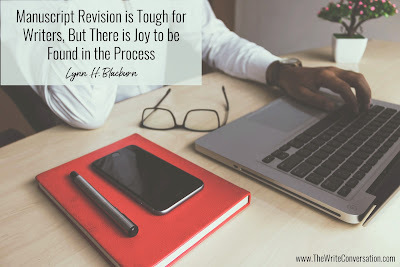
by Lynn H. Blackburn @LynnHBlackburn
At a recent outing to Starbucks with a group of writers, I stared at my computer and said, quite loudly, “I hate revisions with every fiber of my being.”
Y’all…a total stranger happened to be walking by. She looked at me and said, “Me too. Me too.”
Of course, it was about 3 seconds later that I realized I had said that right in front of a wonderful editor, an editor I call a friend, and a man who has coached many writers to excellence. ***Open mouth…insert foot.***
But the thing is…it’s true. I hate revisions. Some writers love them. They enjoy picking the story apart and putting it back together.
Not me. I want to get the story right the first time. I want it to be perfect. And every time my editor points out things like, “these doors were automatic doors in chapter 1 but this scene in chapter 12 makes them sound like hinged doors…so which is it?” I want to throw my laptop out a window.
I know not every writer has such a visceral reaction to the editorial process. But for those of you for whom revisions are painful and stressful, allow me to share with you the things I remind myself of during the process to help me stay on track.
An Acronym for Writers Facing RevisionHere we go:
R: Revisions are hard for many reasons. Some of those reasons are probably rooted deep in your psyche and you may not fully understand why the process makes you a bit (or a lot) ragey. While I’m a fan of the self-examination/self-discovery that will help you make sense of what’s going on, sometimes the best thing you can do is stop fighting it. Accept that you don’t enjoy revisions. Give yourself grace. Don’t let anyone shame you for feeling this way. You don’t get to skip the revisions. You have to work through them. But it’s okay if your method of managing the emotions doesn’t match the way your fellow writers do it. I have writer friends who knock out their revisions in a couple of long sessions and they’re done. I can’t do that. I get through most of my revisions by spending 15 minutes of revising followed by 15 minutes of reading.
E: Editors are friends. (If you immediately thought “editors are friends, not food” we can be great friends). But seriously, sometimes it’s crucial to remind yourself of this. Especially when you’ve opened a manuscript that’s covered in track changes. Editors aren’t out to make your life miserable. They aren’t out to make you mad. They are the best friend an author can have. Their goal is to work together with the author to create a masterpiece. In most cases, there won’t be another person in an author’s world that will have as much invested in the manuscript at their editor. It’s your book baby, but once they start editing it, it’s also theirs. They want it to be beautiful. Remind yourself of that when emotions start running high.
V: Vulnerability is painful. I don’t know anyone who enjoys it. And if you don’t think the process of having an editor picking apart every word in a manuscript puts an author in an extremely vulnerable position, then you haven’t put enough of yourself into that manuscript. I’m a professional. I can intellectually understand that the book is not me. But I poured a year of my life into that book. Why would I assume that having someone point out the flaws wouldn’t hurt? The feeling of vulnerability isn’t one that goes away for me. So it’s crucial that I recognize that my feelings/emotions around the process are valid. Then I can work through them and keep going.
I: Insist on what matters most to you but remember that not everything is critical. The editorial process has been the single biggest factor in helping me “grow up” as an author. When I have to decide if I agree with my editor’s suggestions - and defend my decision if I don’t - I’m forced to take responsibility for every part of the manuscript. I have to take emotion out of it, look at my own work with a critical eye, take input, make a choice, and deal with any repercussions. I have to decide if it really matters. If it doesn’t, it’s usually best to bend.
S: Smooth the path with sweetness. I’m all for standing up for myself as an author, but I don’t have to be a shrew in the process. When I need to push back on something, I make sure I keep my attitude out of it. To do this, I never send my comments back to my editor immediately. I let them simmer for a few days and read back over them to be sure they are spoken in a way that is Christ-like and professional.
Of course, you could also take this to mean that keeping some sweet treats on hand will smooth the revision process. I wouldn’t be able to argue with you about that!
E: Expect magic. I don’t expect to enjoy the process. I’m revising my ninth novel right now. I’m not enjoying it. I see every flaw, every mistake, and it irks me to no end. But I know that as much as I struggle through this part, when it’s done, the end product is something so much more than what it was to begin with. Truly, it’s a very special kind of magic. As much as I moan and groan, I would never put an unedited manuscript into the world. Never. When I remind myself of how crucial revisions are to creating the final version of the book, I’m better able to work through the process.
So…how about you? Do you enjoy revisions? Do you have a favorite method for surviving them? I’d love to hear it!
Grace and peace,Lynn
TWEETABLEManuscript Revision is Tough for Writers, But There is Joy to be Found in the Process, insight from author @LynnHBlackburn on @EdieMelson (Click to Tweet)
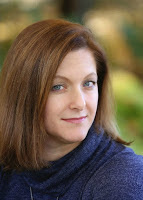 Lynn H. Blackburn loves writing romantic suspense because her childhood fantasy was to become a spy, but her grown-up reality is that she's a huge chicken and would have been caught on her first mission. She prefers to live vicariously through her characters and loves putting them into all kinds of terrifying situations while she's sitting at home safe and sound in her pajamas!
Lynn H. Blackburn loves writing romantic suspense because her childhood fantasy was to become a spy, but her grown-up reality is that she's a huge chicken and would have been caught on her first mission. She prefers to live vicariously through her characters and loves putting them into all kinds of terrifying situations while she's sitting at home safe and sound in her pajamas! Unknown Threat, the first book in her Defend and Protect series, was a 2021 Christy Award finalist and her previous titles have won the Carol Award, the Selah Award, and the Faith, Hope, and Love Reader’s Choice Award. Malicious Intent, the second book in the series, released March 2022.
She is a frequent conference speaker and has taught writers all over the country. Lynn lives in South Carolina with her true love and their three children. You can follow her real life happily ever after by signing up for her newsletter at LYNNHBLACKBURN.COMand @LynnHBlackburn on BOOKBUB, FACEBOOK, TWITTER, PINTEREST, and INSTAGRAM.
Featured Image: Photo by rupixen.com on Unsplash
Published on July 05, 2023 22:00
July 4, 2023
Don't fall Into the TMI Trap on Social Media
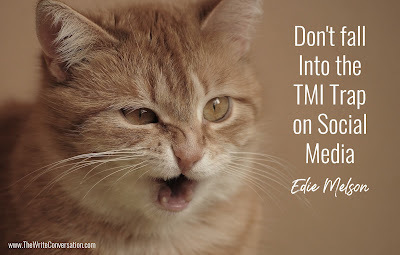
by Edie Melson @EdieMelson
For an author, building an online presence that’s both professional and personable can be a bit of a tightrope walk. After all, we’ve all cringed at some of the intimate details shared in ill-considered tweets and Facebook posts. We want to connect with our readers as honestly and as genuinely as possible. But we also want to present ourselves as the professionals we are. I’ve had a lot of writers ask for guidance on where to draw that line.
The good news is that there are some guidelines you can follows. The bad news is, there are exceptions to almost every rule. Each author relates differently in person and to be authentic, we must carry that personal bent into our online presence.
Things to ShareThere are some things we all enjoy sharing, whether or not we’re directly involved. That’s where this list fits. It’s not an exhaustive list, but I’m including enough suggestions so you can get a strong idea of what’s good to share. These things shouldn’t make up the majority of your social media updates or blog posts, but sprinkling them in can make you more approachable and even fun.An engagement or a wedding. This can be yours, or a close family member. You don’t want to take up space about a second cousin once removed, but engagement pictures are always fun to see.New baby or grandbaby. Again, we all like to see this occasionally. New life is a reason to celebrate. But with this type of update, like the previous one, a little bit goes a long way. If you want to post an album of photos, that’s fine, but don’t share photo after photo after photo in your news feed.Pet photos and stories. People love their pets. More than that, they love people who love pets. This type of a personal update can give you some good visibility through social media.Exciting news that’s publishing related. This might be a book cover reveal, signing a contract with a publisher and/or agent, even winning a contest.A recipe. Recipes are popular on social media. But if you’re not writing a cookbook, or incorporating recipes in your platform, share sparingly.Prayer requests. I purposely included this at the end of the list because you must be very careful here. First, you need to be aware that people will share what you share, so make sure it’s not confidential and you don’t mind if everyone knows about it. Second, you’re opening a door. Once you share a prayer request, your friends and followers will feel free to share with you. You could be opening a floodgate. That’s not always a bad thing, but it’s a decision you need to make before you share.
Things NOT to ShareI hate to even have to say it, but anything that might trigger a gross-out response should always be off limits. This includes everything from descriptions of medical procedures, accidents, trips to the personal facilities and spiders. Yep, spiders. There are a lot of people out there who will freak out at the picture of a leggy arachnid, so post at your own risk.Anything negative about a specific person or company. This doesn’t include rants about generalities, such as taxes. But I’ve NEVER seen an instance where calling someone out publicly ended well for either party.Any update that lets people know your home is vacant. This isn’t something that will offend your followers, but is a danger for you personally. Posting vacation pictures, while you’re still away, is an open invitation to burglars.Any update that shows you checking in someplace. If you want to endorse a place, share why you enjoyed your experience. But for all our sakes, disable location settings that pop up with a map of where you are in your social media feeds.
Bottom LineNavigating our interactions online is a lot like attending a large party. All the same rules apply.Don’t hog the conversation.Don’t talk about yourself too much.Don’t share things that make others uncomfortable.Don’t gossip.Don’t bash someone’s reputation.
Trust me, you do not want to be the person everyone at the party avoids. Being personable and sharing bits of your personal life online can enhance your overall image. Staying upbeat, encouraging and positive whenever possible will make you someone people want to know, online and off.
TWEETABLEDon't fall Into the TMI Trap on Social Media, tips from @EdieMelson (Click to Tweet)
 Edie Melson is a woman of faith with ink-stained fingers observing life through her camera lens. She’s a writer who feels lost without that device & an unexpected speaker who loves to encourage an audience. She also embraces the ultimate contradiction of being an organized creative. She knows the necessity of Soul Care and leads retreats, conferences & workshops around the world on staying connected to God. Her numerous books, including the award-winning Soul Cares eries & reflect her passion to help others develop the strength of their God-given gifts. Her blog, The Write Conversation is recognized as one of the top 101 industry resources.
Edie Melson is a woman of faith with ink-stained fingers observing life through her camera lens. She’s a writer who feels lost without that device & an unexpected speaker who loves to encourage an audience. She also embraces the ultimate contradiction of being an organized creative. She knows the necessity of Soul Care and leads retreats, conferences & workshops around the world on staying connected to God. Her numerous books, including the award-winning Soul Cares eries & reflect her passion to help others develop the strength of their God-given gifts. Her blog, The Write Conversation is recognized as one of the top 101 industry resources. She and husband Kirk have been married 40+ years and raised three sons. They live in the foothills of the Blue Ridge Mountains and can often be found hiking—with Edie clinging to the edge of a precipice for the perfect camera angle and Kirk patiently carrying her camera bag and tripod. Connect with her on her website, WWW.EDIEMELSON.COM and through social media.
Published on July 04, 2023 22:00



